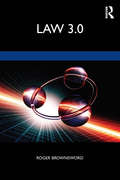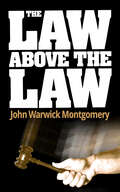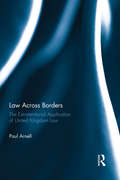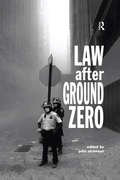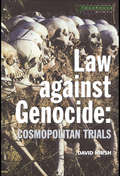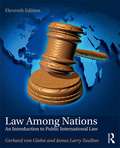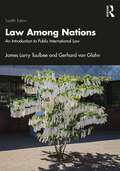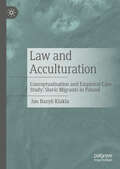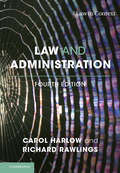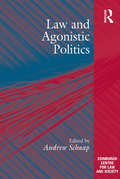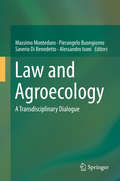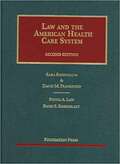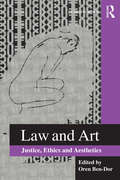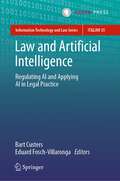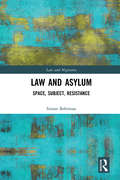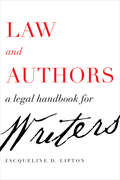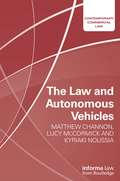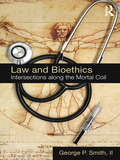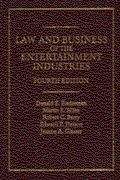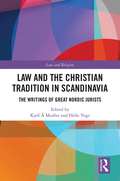- Table View
- List View
Law 3.0: Rules, Regulation, and Technology
by Roger BrownswordPutting technology front and centre in our thinking about law, this book introduces Law 3.0: the future of the legal landscape. Technology not only disrupts the traditional idea of what it is ‘to think like a lawyer,’ as per Law 1.0; it presents major challenges to regulators who are reasoning in a Law 2.0 mode. As this book demonstrates, the latest developments in technology offer regulators the possibility of employing a technical fix rather than just relying on rules – thus, we are introducing Law 3.0. Law 3.0 represents, so to speak, the state we are in and the conversation that we now need to have, and this book identifies some of the key points for discussion in that conversation. Thinking like a lawyer might continue to be associated with Law 1.0, but from 2020 onward, Law 3.0 is the conversation that we all need to join. And, as this book argues, law and the evolution of legal reasoning cannot be adequately understood unless we grasp the significance of technology in shaping both legal doctrine and our regulatory thinking. This is a book for those studying, or about to study, law – as well as others with interests in the legal, political, and social impact of technology.
The Law Above The Law
by John Warwick MontgomeryWe are well on the way to the fulfillment of this prophetic statement. When the level of public virtue falls, our interpretation of justice tends to modify downward. If, therefore, our only criterion for judging ethical action is the current collective conscience, we have no valid standard whatever, since that conscience is constantly being altered. Result: Our legal system is fast becoming the tool of public opinion. Is there an alternative? Montgomery insists that modern men must begin once again to judge their behavior on the basis of God's revelation of right and wrong. In this little book he argues his case briefiy but brilliantly, and conveys a sense of certainty that is both challenging and refreshing.
Law Across Borders: The Extraterritorial Application of United Kingdom Law
by Paul ArnellThis book examines the application of UK Criminal and Human Rights Law to people and circumstances outside the United Kingdom. Building upon previous analyses which have focused on a single aspect of extraterritorially, this book examines the fields of Criminal and Human Rights law as the two main areas of non-private law which are frequently applied across borders. Both fields are placed in context before being drawn together in a coherent and systematic way. The book examines recent law and practice, as well as historic developments and explores the concept of enforcement. The author’s analysis includes coverage of topics such as the criminalisation of sex-tourism, the extradition of white-collar criminals and the application of human rights law to Iraq following American and British intervention in the region. Law Across Borders goes on to point the way forward in the development of the extraterritorial application of public law, and suggests ways in which greater coherence can be achieved. This book will be of particular interest to practitioners, academics and scholars of International Law, Human Rights Law and Criminal Law. It is unique in its ambition to offer a comprehensive description and analysis of the extra-territorial application of UK Human Rights Law and Criminal Law in a single text.
Law after Ground Zero
by John StrawsonFollowing the events of September 11, a new legal order is emerging in which the 'terrorist threat' has been used as justification to marginalise human rights. This collection of themed essays offers an emphatic defence to the threats confronting our human rights culture. In analysing the role of the United Nations, the conduct of the Afghan war, domestic anti-terrorist legislation and the new debate about Islamic law, Law after Ground Zero demonstrates the future challenges that law will face within our global society. It also offers accounts of how events have impacted on the Palestinian-Israeli conflict, Iraq and Afghanistan itself, as well as debates about international law, human rights and women's rights. This unique work will interest those studying or researching in the areas of international law, human rights and humanitarian law, international relations, politics, critical legal studies, Islamic law, culture and socio-legal studies.
Law Against Genocide: Cosmopolitan Trials
by David HirshBringing a sociologist's insight to legal institutions and narratives, this book is an innovative and timely sociological contribution to current concerns regarding critical cosmopolitanism, human rights and crimes against humanity.
Law against the State
by Julia Eckert Brian Donahoe Christian Strümpell Zerrin Özlem BinerThis collection of rich, empirically grounded case studies investigates the conditions and consequences of 'juridification' – the use of law by ordinary individuals as a form of protest against 'the state'. Starting from the actual practices of claimants, these case studies address the translation and interpretation of legal norms into local concepts, actions and practices in a way that highlights the social and cultural dynamism and multivocality of communities in their interaction with the law and legal norms. The contributors to this volume challenge the image of homogeneous and primordially norm-bound cultures that has been (unintentionally) perpetuated by some of the more prevalent treatments of law and culture. This volume highlights the heterogeneous geography of law and the ways boundaries between different legal bodies are transcended in struggles for rights. Contributions include case studies from South Africa, Malawi, Sierra Leone, Turkey, India, Papua New Guinea, Suriname, the Marshall Islands and Russia.
Law Among Nations: An Introduction to Public International Law
by Gerhard Von Glahn James Larry TaulbeeOffering a more accessible alternative to casebooks and historical commentaries, Law Among Nations explains issues of international law by tracing the field's development and stressing key principles and processes. This comprehensive text eliminates the need for multiple books by combining discussions of theory and state practice with excerpts from landmark cases. Renowned for its rigorous approach and clear explanations, Law Among Nations remains the gold standard for undergraduate introductions to international law. Learning Goals Trace the development of International Law through key principles and processes. Illustrate important issues and theories using excerpts from landmark cases.
Law Among Nations: An Introduction to Public International Law
by Gerhard Von Glahn James Larry TaulbeeOffering a more accessible alternative to casebooks and historical commentaries, Law Among Nations explains issues of international law by tracing the field's development and stressing key principles, processes, and landmark cases. This comprehensive text eliminates the need for multiple books by combining discussions of theory and state practice with excerpts from landmark cases. The book has been updated in light of the continuing revolution in communication technology, the dense web of linkages between countries that involve individuals and bodies both formal and informal; and covers important and controversial areas such as human rights, the environment, and issues associated with the use of force. Renowned for its rigorous approach and clear explanations, Law Among Nations remains the gold standard for undergraduate introductions to international law. New to the Eleventh Edition Added or expanded coverage of timely issues in international law: Drones and their use in the air and in space Immigration Islamic views of international law Inviolability and the difference between diplomatic immunity and sovereignty, in light of the Benghazi attack Thoroughly rewritten chapters in areas of great change: International criminal law Just war and war crime law New cases, statutes, and treaties on many subjects
Law Among Nations: An Introduction to Public International Law
by James Larry Taulbee Gerhard von GlahnOffering a more accessible alternative to casebooks and historical commentaries, Law Among Nations explains issues of international law by tracing the field’s development and stressing key principles, processes, and landmark cases. This comprehensive text eliminates the need for multiple books by combining discussions of theory and state practice with excerpts from landmark cases. The book has been updated in light of the continuing revolution in communication technology; the dense web of linkages between countries that involve individuals and bodies both formal and informal; and important and controversial areas such as human rights, the environment, and issues associated with the use of force. Renowned for its rigorous approach and clear explanations, Law Among Nations remains the gold standard for undergraduate introductions to international law. New to the Twelfth Edition Added or expanded coverage of timely issues in international law: Drones and their use in the air and in space Outer space Cybercrime and responses The Julian Assange Case Environmental law Expanded discussion of space law Expanded discussion of conflict and non-state actors Final cases in the ICTY Thoroughly rewritten chapters on areas of great change: International Criminal Law Just War and War Crime Law International Economic Law (newly restored in response to reviews) International Environmental Law New cases, statutes, and treaties on many subjects
Law and Acculturation: Conceptualisation and Empirical Case Study: Slavic Migrants in Poland
by Jan Bazyli KlaklaThis book is one of the first attempts to directly explore the relationship between law and acculturation. By exploring the theoretical basis of the concept of culture, the ideas of law and various models of acculturation, it brings a nuanced theorization and problematization of the intricate connection between law and acculturation. It does this through theory and then presents the findings of the author’s qualitative empirical study conducted with a group of long-term Slavic migrants residing in Poland. The book culminates by demonstrating how the law can be integrated into one of the theoretical models of acculturation, specifically the Relative Acculturation Extended Model.
Law and Administration (Law in Context)
by Carol Harlow Richard RawlingsLaw and Administration takes a contextual approach to administrative law, setting law and legal rules in the context of the social, political and economic forces that shape the law, and of the complex constitutional framework in which contemporary administrative law operates. This book contains a full account of judicial review, the traditional heartland of administrative law, and adds to this by taking into account the concerns of government, officials and agencies who operate and shape the law. It also looks at the possible future of administrative law in an increasingly automated and digitalised world. A fully revised and updated new edition, this book includes new case studies of regulatory agencies and government contracting to develop understanding of law in practice.
Law and Agonistic Politics (Edinburgh/glasgow Law And Society Ser.)
by Andrew SchaapThe Ancient Greek notion of agonism, meaning struggle, has been revived in radical legal and political theory to rethematize class conflict and to conceptualize the conditions of possibility of freedom and social transformation in contemporary society. Insisting that what is ultimately at stake in politics are the terms in which social conflict is represented, agonists highlight the importance of the strategic, affective and aesthetic aspects of politics for democratic praxis. This volume examines the implications of this critical perspective for understanding law and considers how law serves either to sustain or curtail the democratic agon. While sharing a critical perspective on the deliberative turn in legal and political theory and its tendency to depoliticize social conflict, the various contributors to this volume diverge in arguing variously for pragmatic, expressivist or strategic conceptions of agonism. In doing so they question the glib assumptions that often underlie a sometimes too easy celebration of conflict as an antidote to de-politicizing consensus. This thought provoking volume will be of interest to students and researchers working in legal and political theory and philosophy.
Law and Agroecology
by Massimo Monteduro Pierangelo Buongiorno Saverio Benedetto Alessandro IsoniThis book represents a first attempt to investigate the relations between Law and Agroecology. There is a need to adopt a transdisciplinary approach to multifunctional agriculture in order to integrate the agroecological paradigm in legal regulation. This does not require a super-law that hierarchically purports to incorporate and supplant the existing legal fields; rather, it calls for the creation of a trans-law that progressively works to coordinate interlegalities between different legal fields, respecting their autonomy but emphasizing their common historical roots in rus in the process. Rus, the rural phenomenon as a whole, reflects the plurality and interdependence of different complex systems based jointly on the land as a central point of reference. "Rural" is more than "agricultural": if agriculture is understood traditionally as an activity aimed at exploiting the land for the production of material goods for use, consumption and private exchange, rurality marks the reintegration of agriculture into a broader sphere, one that is not only economic, but also social and cultural; not only material, but also ideal, relational, historical, and symbolic; and not only private, but also public. In approaching rus, the natural and social sciences first became specialized, multiplied, and compartmentalized in a plurality of first-order disciplines; later, they began a process of integration into Agroecology as a second-order, multi-perspective and shared research platform. Today, Agroecology is a transdiscipline that integrates other fields of knowledge into the concept of agroecosystems viewed as socio-ecological systems. However, the law seems to still be stuck in the first stage. Following a reductionist approach, law has deconstructed and shattered the universe of rus into countless, disjointed legal elementary particles, multiplying the planes of analysis and, in particular, keeping Agricultural Law and Environmental Law two separate fields.
Law And The American Health Care System, 2d (University Casebook Ser.)
by Sara Rosenbaum David Frankford Sylvia Law Rand RosenblattLaw and the American Health Care System (University Casebook Series) 2nd Edition
Law And Ardor
by Ralph McinernyAndrew Broom is pleased to be working on an investigation in which he can combine a visit to the crime scene with a quick nine holes. But-
Law and Art: Justice, Ethics and Aesthetics
by Oren Ben-DorIn engaging with the full range of 'the arts', contributors to this volume consider the relationship between law, justice, the ethical and the aesthetic. Art continually informs the ethics of a legal theory concerned to address how theoretical abstractions and concrete oppressions overlook singularity and spontaneity. Indeed, the exercise of the legal role and the scholarly understanding of legal texts were classically defined as ars iuris - an art of law - which drew on the panoply of humanist disciplines, from philology to fine art. That tradition has fallen by the wayside, particularly in the wake of modernism. But approaching art in that way risks distorting the very inexpressibility to which art is attentive and responsive, whilst remaining a custodian of its mystery. The novelty and ambition of this book, then, is to elicit, in very different ways, styles and orientations, the importance of the relationship between law and art. What can law and art bring to one another, and what can their relationship tell us about how truth relates to power? The insights presented in this collection disturb and supplement conventional accounts of justice; inaugurating new possibilities for addressing the origin of violence in our world.
Law and Artificial Intelligence: Regulating AI and Applying AI in Legal Practice (Information Technology and Law Series #35)
by Bart Custers Eduard Fosch-VillarongaThis book provides an in-depth overview of what is currently happening in the field of Law and Artificial Intelligence (AI). From deep fakes and disinformation to killer robots, surgical robots, and AI lawmaking, the many and varied contributors to this volume discuss how AI could and should be regulated in the areas of public law, including constitutional law, human rights law, criminal law, and tax law, as well as areas of private law, including liability law, competition law, and consumer law. Aimed at an audience without a background in technology, this book covers how AI changes these areas of law as well as legal practice itself. This scholarship should prove of value to academics in several disciplines (e.g., law, ethics, sociology, politics, and public administration) and those who may find themselves confronted with AI in the course of their work, particularly people working within the legal domain (e.g., lawyers, judges, law enforcement officers, public prosecutors, lawmakers, and policy advisors).Bart Custers is Professor of Law and Data Science at eLaw - Center for Law and Digital Technologies at Leiden University in the Netherlands.Eduard Fosch-Villaronga is Assistant Professor at eLaw - Center for Law and Digital Technologies at Leiden University in the Netherlands.
Law and Asylum: Space, Subject, Resistance (Law and Migration)
by Simon BehrmanIn contrast to the claim that refugee law has been a key in guaranteeing a space of protection for refugees, this book argues that law has been instrumental in eliminating spaces of protection, not just from one’s persecutors but also from the grasp of sovereign power. By uncovering certain fundamental aspects of asylum as practised in the past and in present day social movements, namely its concern with defining space rather than people and its role as a space of resistance or otherness to sovereign law, this book demonstrates that asylum has historically been antagonistic to law and vice versa. In contrast, twentieth-century refugee law was constructed precisely to ensure the effective management and control over the movements of forced migrants. To illustrate the complex ways in which these two paradigms – asylum and refugee law – interact with one another, this book examines their historical development and concludes with in-depth studies of the Sanctuary Movement in the United States and the Sans-Papiers of France. The book will appeal to researchers and students of refugee law and refugee studies; legal and political philosophy; ancient, medieval and modern legal history; and sociology of political movements.
Law and Authority in British Legal History, 1200–1900
by Mark GodfreyBy presenting original research into British legal history, this volume emphasises the historical shaping of the law by ideas of authority. The essays offer perspectives upon the way that ideas of authority underpinned the conceptualisation and interpretation of legal sources over time and became embedded in legal institutions. The contributors explore the basis of the authority of particular sources of law, such as legislation or court judgments, and highlight how this was affected by shifting ideas relating to concepts of sovereignty, religion, political legitimacy, the nature of law, equity and judicial interpretation. The analysis also encompasses ideas of authority which influenced the development of courts, remedies and jurisdictions, international aspects of legal authority when questions of foreign law or jurisdiction arose in British courts, the wider authority of systems of legal ideas such as natural law, the authority of legal treatises, and the relationship between history, law and legal thought.
Law and Authors: A Legal Handbook for Writers
by Jacqueline D. LiptonThis accessible, reader-friendly handbook will be an invaluable resource for authors, agents, and editors in navigating the legal landscape of the contemporary publishing industry. Drawing on a wealth of experience in legal scholarship and publishing, Jacqueline D. Lipton provides a useful legal guide for writers whatever their levels of expertise or categories of work (fiction, nonfiction, or academic). Through case studies and hypothetical examples, Law and Authors addresses issues of copyright law, including explanations of fair use and the public domain; trademark and branding concerns for those embarking on a publishing career; laws that impact the ways that authors might use social media and marketing promotions; and privacy and defamation questions that writers may face. Although the book focuses on American law, it highlights key areas where laws in other countries differ from those in the United States. Law and Authors will prepare every writer for the inevitable and the unexpected.
The Law and Autonomous Vehicles (Contemporary Commercial Law)
by Matthew Channon Lucy McCormick Kyriaki NoussiaWhen will we see autonomous vehicles on our roads? The answer is that to some degree, they are already here. Numerous organisations are testing fully autonomous prototypes on public roads in the UK, and even commercially available vehicles already have several ‘quasi-autonomous’ features. KPMG has forecasted that the connected and autonomous vehicles market could be worth as much as £51 billion to the British economy by 2030 and could create some 30,000 new jobs over the same period. Accordingly, the UK and a number of other jurisdictions are already implementing legal reforms with a view to smoothing the path for this technology. Notably, Parliament has passed the Automated and Electric Vehicles Act 2018 dealing with the insurance of such vehicles, and changes are currently being made to the Road Vehicle (Construction and Use) Regulations 1986 and to the Highway Code to accommodate highly automated technologies. The government has also issued non-statutory guidance in relation to testing on public roads, and in relation to vehicle cybersecurity. Against this rapidly changing landscape, this book analyses the key legal issues facing autonomous vehicles, including testing on public roads, insurance, product liability, and cyber security and data protection. It also examines the approach being taken in other jurisdictions, including Austria, Germany, Greece, Italy, the USA, and South Africa.
Law and Bioethics: Intersections Along the Mortal Coil
by George P. Smith IIGeorge P. Smith, II is a leading figure in the world of medical law and ethics. During his long career he has addressed some of the most important issues in bioethics and has contributed much original thought to debates in the field. This book celebrates his contribution to scholarship in this area and brings together his key writings in bioethics. The chapters include previously published material which has been substantially updated to reflect recent developments in medicine and law. The book covers topics such as: human rights and medical law; the allocation of resources and distributive justice; ethical relativism; science and religion; and public health emergencies. Taken as a whole, this book examines the extent to which law, medicine, economics, and bioethics interact as synergistic vectors of force in shaping and setting both personal and public responses to the complexities of biotechnology, or what has been referred to as "The New Biology." All too often, past considerations of this topic have neglected to recognise the synergistic influences of law as a catalyst for codifying contemporary values into normative standards. Professor Smith reaches the conclusion that if traditional bioethical principles are to be seen as pertinent constructs for policy making, they must be broadened through the law of public health and Human rights. Law and Bioethics: Intersections along the Mortal Coil casts law as the pivotal force in bringing stability to the ongoing debates on how to maintain bioethical relevance in decision making and in so doing, it offers an excellent overview of the current bioethical issues in medical law considered in light of recent and ongoing technological developments in medicine. This book will be of particular interest to academics and students of Law, Political Science, Philosophy and Economics.
The Law and Business of International Project Finance
by Scott L. HoffmanThis 2007 third edition continues to be a comprehensive and authoritative guide to the business, practice, law, and practical use of project finance. It covers the complete project finance structure, from conception to negotiation to debt closing, and from project difficulties to successful restructuring. The book continues to be accessible to those with little experience in project finance, while maintaining the insight and detail of previous editions that has made it a valuable reference for the experienced lawyer, manager, banker, contractor, and government official. This edition focuses on a real-world, practical approach to project finance, without the overuse of case studies and economic theory. Yet the contract forms, detailed glossary, index, and project finance bibliography make it a complete text.
Law and Business of the Entertainment Industries: Fourth Edition
by Donald E. Biederman Martin E. Silfen Robert C. Berry Edward P. Pierson Jeanne A. GlasserThis edition is divided into two parts--one dealing with general principles and the other dealing with specific entertainment and related industries.
Law and The Christian Tradition in Scandinavia: The Writings of Great Nordic Jurists (Law and Religion)
by Kjell Å Modéer and Helle VogtThis book presents a comprehensive history of law and religion in the Nordic context. The entwinement of law and religion in Scandinavia encompasses an unusual history, not widely known yet important for its impact on contemporary political and international relations in the region. The volume provides a holistic picture from the first written legal sources of the twelfth century to the law of the present secular welfare states. It recounts this history through biographical case studies. Taking the point of view of major influential figures in church, politics, university, and law, it thus presents the principal actors who served as catalysts in ecclesiastical and secular law through the centuries. This refreshing approach to legal history contributes to a new trend in historiography, particularly articulated by a younger generation of experienced Nordic scholars whose work is featured prominently in this volume. The collection will be a valuable resource for academics and researchers working in the areas of Legal History and Law and Religion.
